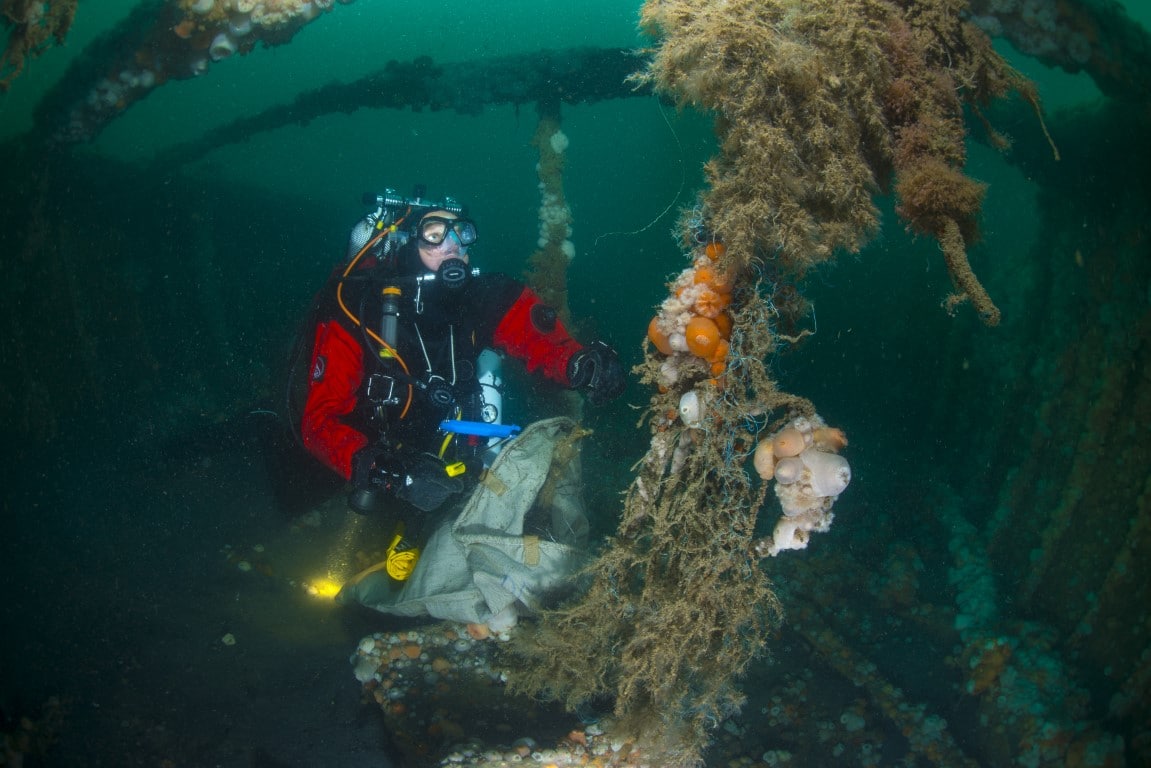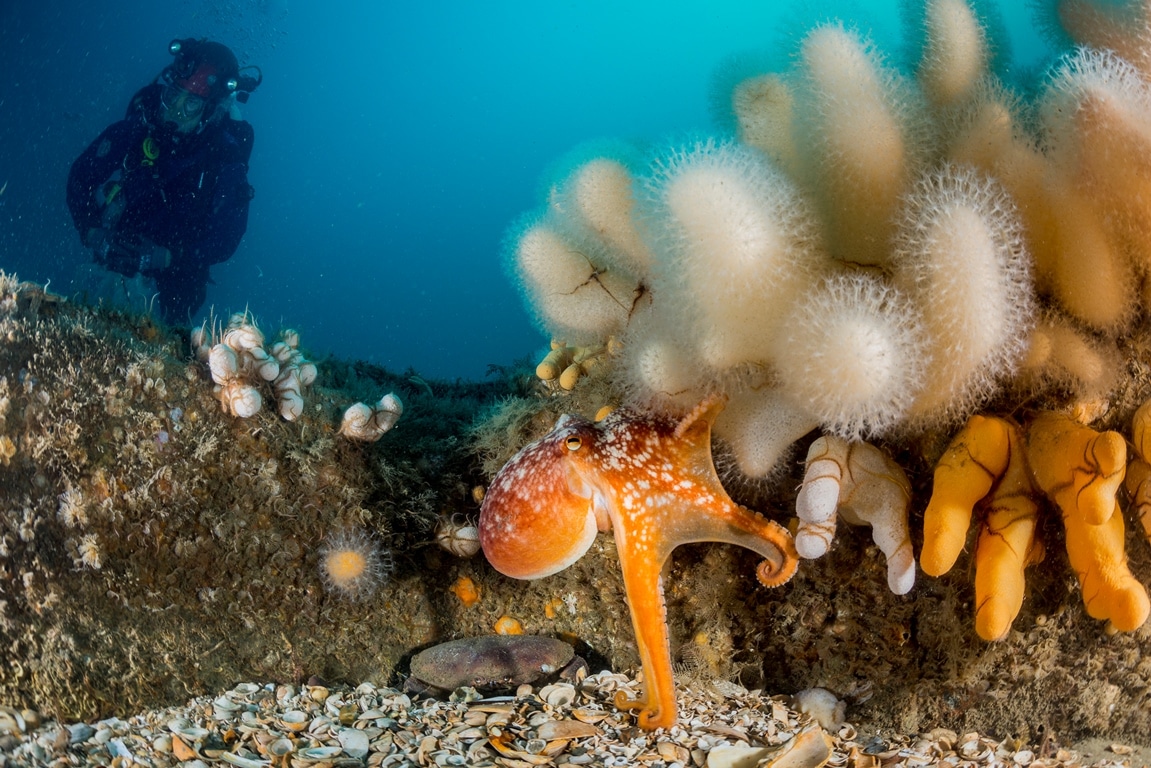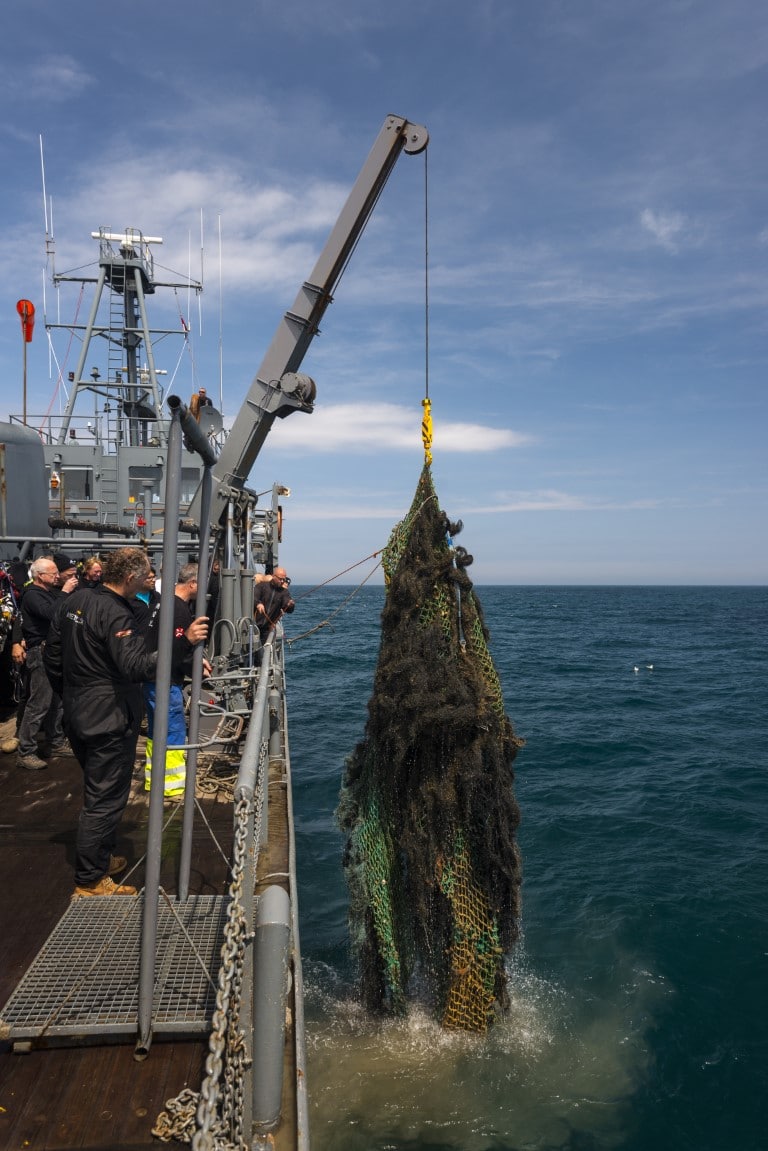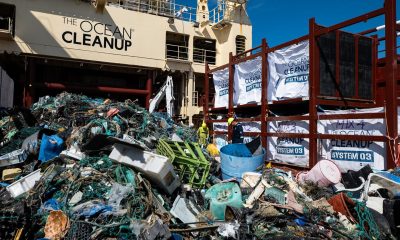News
Dutch voluntary organisation visits English waters on diving and cleaning expedition

The Dutch Dive the North Sea Clean Foundation (DtNC) departed last week for their 12th diving expedition in the North Sea aboard the Cdt. Fourcault. Expedition North Sea 2018 is dedicated to discovering and cleaning wrecks in England and the Netherlands. 30 experienced volunteer divers remove waste during the 10 day expedition at 20 locations (in particular ghost nets, lead, fishing hooks and lures), liberate animals, collect biological and archaeological data and photograph and film.
“With this expedition we want to bring both the beauty, vulnerability and litter of the North Sea to the attention of the general public,” says Ben Stiefelhagen, Expedition leader and founder DtNC.

Cleaning has a high priority because nets, lines and other rubbish break off slowly into smaller pieces which are difficult to remove from the sea. In addition to cleaning, there are other activities on the program:
- The expedition ship Cdt. Fourcault sails first to wrecks near the Dutch coast where a pilot is started with a photogrammetry scan – a method to image wrecks in 3D.
- From there, the team sails to biologically interesting Natura2000 protected areas on the border between the Netherlands and England, including the Brown Ridge and the Dogger Bank, where unique species were previously observed and expected again.
- The divers dive on various wrecks, including a sunken oil production platform.
- In English waters, the team visits the enormous Southern North Sea marine protected area for Harbour Porpoises. They then move northwest to Coquet to St Mary’s, Farnes East, and Berwickshire and North Northumberland protected areas (protecting reefs and rich muds). This furthest destination of the expedition is also a special bird nature area, also known for its fish-rich waters with kelp and numerous grey seals.
DtNC cooperates with the UK Marine Conservation Society to guide its actions in UK waters and to inform policy makers and the general public in UK about the expedition and its results.

“The North Sea Foundation helps on board and tells the story of this expedition. This is how we show the Netherlands our beautiful North Sea, which is more than worth it!” said Floris van Hest, Director of the North Sea Foundation.
“Whilst UK has protected many inshore areas from damaging bottom trawling and dredging, there are no bans on any trawling or netting in the Dogger Bank, Farnes East, Coquet to St Mary’s and Harbour Porpoise MPAs in the the North Sea. Working together, we can show the biodiversity and life in these remote places,” said Dr Jean-Luc Solandt, MPA specialist, Marine Conservation Society.
 Expedition North Sea 2018
Expedition North Sea 2018
This expedition is an initiative of the Dive The North Sea Clean Foundation in collaboration with the Dutch North Sea Foundation and the UK Marine Conservation Society. The expedition team consists of marine biologists, amateur archaeologists, ecologists, underwater photographers, film makers and support divers plus crew.
The diving work can only be done by very experienced divers in view of the difficult circumstances in which the project has to be carried out: 25 to 45 meters depth in cold, running water with varying visibility (2 to 25 meters). From the 11 expeditions that have been carried out so far, the foundation has shown that marine life in the North Sea is surprisingly diverse and colorful, which strengthens the importance of nature conservation.
The team works closely with research agencies, industry, universities and the government. DtNC wants to put the importance of natural and artificial reefs (including wrecks) in the North Sea on the map and stimulate a sound marine protection policy. Wrecks, boulders, cobbles and rocky reefs act as nurseries and shelter for many life forms. It is estimated that more than 500 different animal species live on these hard substrates in the Netherlands alone. Moreover, wrecks are time capsules of great cultural-historical importance. Since 2011, the foundation has already organized 11 successful expeditions to various areas in the Dutch part of the North Sea.
Follow the website and Facebook of The North Sea Clean Foundation and The North Sea Foundation for more information. Use: https://map.mpa-reality-check.
Blogs
The Ocean Cleanup Breaks 10,000,000 KG Barrier

The Ocean Cleanup, the global non-profit project, has removed a verified all-time total of ten million kilograms (22 million lbs.) of trash from oceans and rivers around the world – approximately the same weight as the Eiffel Tower.
To complete its mission of ridding the oceans of plastic, The Ocean Cleanup uses a dual strategy: cleaning up the Great Pacific Garbage Patch (GPGP) to remove the plastic already afloat in the oceans, while stopping the flow of plastic from the world’s most polluting rivers.
Through cleaning operations in the GPGP and in rivers in eight countries, the cumulative total of trash removed has now surpassed ten million kilograms. This milestone demonstrates the acceleration of The Ocean Cleanup’s impact, while underlining the astonishing scale of the plastic pollution problem and the need for continued support and action.
While encouraging for the mission, this milestone is only a staging point: millions more tons of plastic still pollute our oceans and The Ocean Cleanup intends to continue learning, improving and innovating to solve this global catastrophe.
This announcement comes as governments from around the world meet to continue negotiations to develop a new legally binding instrument to end plastic pollution at INC4 in Ottawa, Canada. Representatives of The Ocean Cleanup will be in attendance and the organization will be urging decision-makers to collaborate towards a comprehensive and ambitious global treaty which addresses plastic at all stages of its life cycle and in all marine environments worldwide, including in areas beyond national jurisdiction.
It is encouraging to see that the need for remediation is reflected in the various options for potential treaty provisions. It is essential that the final treaty contains clear targets for the remediation of legacy plastic pollution, and reduction of riverine plastic emissions.
Tackling plastic pollution requires innovative and impactful solutions. The treaty should therefore incentivize the innovation ecosystem by fostering innovations that make maximal use of data, technology and scientific knowledge – such as those designed and deployed by The Ocean Cleanup.
‘After many tough years of trial and error, it’s amazing to see our work is starting to pay off – and I am proud of the team who has brought us to this point.’ said Boyan Slat, Founder and CEO of The Ocean Cleanup. ‘While we still have a long way to go, our recent successes fill us with renewed confidence that the oceans can be cleaned.’
The Ocean Cleanup was founded in 2013 and captured its first plastic in 2019, with the first confirmed catch in the GPGP coming soon after the deployment of Interceptor 001 in Jakarta, Indonesia. After surpassing one million kilograms of trash removed in early 2022, the non-profit project has since progressed to the third iteration of its GPGP cleaning solution, known as System 03, and a network of Interceptors currently covering rivers in eight countries, with more deployments set for 2024.
About The Ocean Cleanup
The Ocean Cleanup is an international non-profit organization that develops and scales technologies to rid the world’s oceans of plastic. They aim to achieve this goal through a dual strategy: stemming the inflow via rivers and cleaning up the legacy plastic that has already accumulated in the ocean. For the latter, The Ocean Cleanup develops large-scale systems to efficiently concentrate the plastic for periodic removal. This plastic is tracked and traced through DNV’s chain of custody model to certify claims of origin when recycling it into new products. To curb the tide via rivers, The Ocean Cleanup has developed Interceptor™ solutions to halt and extract riverine plastic before it reaches the ocean. Founded in 2013 by Boyan Slat, The Ocean Cleanup now employs a broadly multi-disciplined team of approximately 140. The foundation is headquartered in Rotterdam, the Netherlands.
For more information, visit: theoceancleanup.com and follow @theoceancleanup on social media.
Marine Life & Conservation
Steve Backshall to headline Shark Trust’s flagship event: For the Love of Sharks

Join a host of amazing, shark loving, speakers including Steve Backshall and the Shark Trust team for an evening celebrating shark conservation at the Royal Geographical Society in London this November.
Date: 29th November 2024
Time: 6-10pm
Location: Royal Geographical Society, London
Tickets: https://www.sharktrust.org/Event/flos24
The event will be a celebration of all things shark. Those lucky enough to get hold of tickets will hear from engaging guest speakers with a passion for sharks.
The line-up includes (*subject to change if unforeseen circumstances arise)
Steve Backshall: One of television’s busiest presenters, BAFTA award-winning wildlife expert Steve has been passionate about the wild world ever since he was young.
Steve’s impressive TV career has taken him all around the world, investigating a wide array of species and environments. Steve has filmed over 100 hours of children’s wildlife programmes with the BAFTA award winning Deadly 60 franchise and recently, with Sky Nature, for his new series ‘Whale with Steve Backshall’. He has been a patron for the Shark Trust for 10 years.
Simon Rogerson: is a photojournalist specialising in natural history, diving and the sea.
He is editor of SCUBA magazine, the official journal of the British Sub-Aqua Club. Simon started his career as a crime reporter but gravitated towards his ‘less depressing’ interest in underwater exploration, joining the staff of DIVE magazine in 1999. In 2005 he was named ‘Editor of the Year’ in the PPA’s Independent Publishing Awards. Simon also works as a freelance writer, contributing frequently to the Sunday Times and Telegraph, in addition to BBC Wildlife, Esquire, and a host of international diving magazines. He is the author of a book, Dive Red Sea, published by Ultimate Sports. Now based in Berkshire, Simon has been a Patron of the Shark Trust for 20 years.
More speakers to be announced soon. Head to the Shark Trust website to learn more.
The evening will also allow guests the final chance to see the Oceanic 31, shark art exhibition. Some of the artwork will be auctioned/raffled at the event, while the rest will be auctioned online to raise money for the Shark Trust Oceanic Programme.
For the Love of Sharks is an evening with something for everyone who is interested and fascinated by sharks. Join the Shark Trust, their Patrons, Trustees and Staff, along with a host of supporters for this celebration of shark conservation.
For more information or to buy a ticket: https://www.sharktrust.org/Event/flos24
-

 News3 months ago
News3 months agoHone your underwater photography skills with Alphamarine Photography at Red Sea Diving Safari in March
-

 News3 months ago
News3 months agoCapturing Critters in Lembeh Underwater Photography Workshop 2024: Event Roundup
-

 Marine Life & Conservation Blogs3 months ago
Marine Life & Conservation Blogs3 months agoCreature Feature: Swell Sharks
-

 Blogs2 months ago
Blogs2 months agoMurex Resorts: Passport to Paradise!
-

 Blogs2 months ago
Blogs2 months agoDiver Discovering Whale Skeletons Beneath Ice Judged World’s Best Underwater Photograph
-

 Gear Reviews3 weeks ago
Gear Reviews3 weeks agoGEAR REVIEW – Revolutionising Diving Comfort: The Sharkskin T2 Chillproof Suit
-

 Gear Reviews3 months ago
Gear Reviews3 months agoGear Review: Oceanic+ Dive Housing for iPhone
-

 Marine Life & Conservation2 months ago
Marine Life & Conservation2 months agoSave the Manatee Club launches brand new webcams at Silver Springs State Park, Florida

















